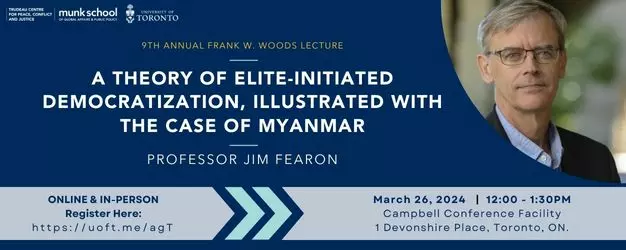
2024 Frank W. Woods Lecture: A Theory of Elite-Initiated Democratization, Illustrated with the Case of Myanmar
March 26, 2024 | 12:00PM - 1:30PM
|
Online & in-person
This event will take place in-person in the Campbell Conference Facility, Munk School, 1 Devonshire Place, Toronto
The Annual Frank Woods Lecture features Professor Jim Fearon! Professor James Fearon is a Theodore and Frances Geballe Professor in the School of Humanities and Sciences, a professor of Political Science, and Senior Fellow in the Freeman-Spogli Institute for International Studies at Stanford University. He is a member of the National Academy of Sciences (elected 2012) and a fellow of the American Academy of Arts and Sciences (elected 2002). Fearon's research interests include civil and interstate war, ethnic conflict, the politics of economic development, and democratic accountability.
The topic of this year's Frank Woods Lecture is "A Theory of Elite-Initiated Democratization, Illustrated with the Case of Myanmar."
Around half of democratic transitions are “top down" in the sense that the autocrats write the constitution that governs post-transition democracy. We analyze a model of elite-driven democratization, illustrating its logic and implications with the case of Myanmar. In the model, continued dictatorship is costly and inefficient due to risk of a violent rebellion and, possibly, the increase in aid, trade, and geopolitical support that would follow democratization. But the autocrats fear that fair elections would lead quickly to their marginalization. We argue, contrary to a common suggestion, that paper constitutions that provide veto points for the old elite are not by themselves sufficient protection. Top-down “democratic transitions" are really cases of power-sharing, in which the old elite retains de facto control of rent streams that the opposition cannot unilaterally seize simply by changing laws. As the military's coup threat gradually declines over time, democracy may eventually “consolidate." If the coup threat declines rapidly, and is anticipated to do so, a reversion back to autocracy is possible. We also show how the prospect of increased international aid, trade, and investment make top-down transitions more likely, though only when post-transition power-sharing is feasible.
This seminar is public and all U of T faculty and students are invited to attend.
